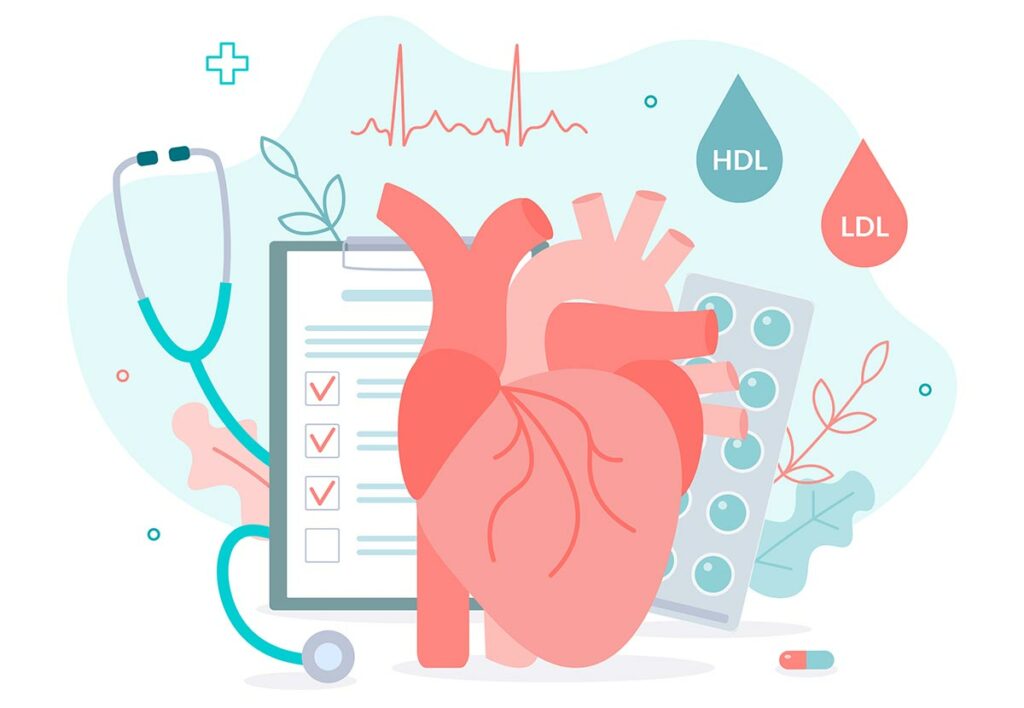If you have high cholesterol, your doctor may prescribe medications to lower your levels. Medical professionals understand that these medications can help reduce your risk of heart disease and other health problems. In this blog post, we will discuss the different types of medicines that are available to treat high cholesterol. We will also discuss the benefits and potential side effects of these medications.

What Is Cholesterol?
Cholesterol is a waxy substance found in the body’s fatty tissues and the membranes of cells. It plays an essential role in many bodily functions, including the production of hormones and the regulation of cell growth. However, too much cholesterol, referred to as hyperlipidemia, leads to a build up in the arteries, eventually leading to heart disease. Therefore, it is important to keep cholesterol levels under control.
There are two types of cholesterol: LDL (low-density lipoprotein) and HDL (high-density lipoprotein). LDL cholesterol is often referred to as “bad” cholesterol because it contributes to plaque build-up in the arteries. HDL cholesterol, on the other hand, is often referred to as “good” cholesterol because it helps to remove plaque from the arteries.
The goal is to have a high level of HDL cholesterol and a low level of LDL cholesterol. This can be achieved through lifestyle changes, such as eating a healthy diet and exercising regularly. Sometimes diet and exercise are not enough and medications may also be necessary for some people. By keeping cholesterol levels under control, you can help to reduce your risk of heart disease and other serious health problems.
Types of Medications To Lower Cholesterol
There are several different types of medications that can be used to lower cholesterol. The most common type of medication is statins. Statins work by reducing the production of cholesterol in the liver. They are very effective at lowering LDL cholesterol and have been shown to reduce the risk of heart disease. However, they can cause side effects, such as muscle pain and fatigue.
Another type of medication is ezetimibe. Ezetimibe works by reducing the absorption of cholesterol in the gut. In patients who have had a heart attack, ezetimibe is often combined with a statin medication to further lower LDL Cholesterol. The key takeaway is that lower levels of LDL cholesterol are associated with lower risk of heart attack.
A relatively new-class of cholesterol lowering medication is a PCSK9 inhibitor. This is an injectable medication that helps the liver clear LDL cholesterol from the bloodstream. This type of medication can be used in conjunction with statin therapy to further lower LDL cholesterol. It is also used for patients who are at high risk for cardiovascular disease but have severe side effects from statins.
Niacin is a medication that increases the level of HDL cholesterol. Unfortunately, large randomized trials have not found niacin to be effective at reducing rates of heart attack or lowering the risk of death.
Omega-three fatty acids are a type of supplement that can be used to lower triglycerides but are less effective at lowering LDL cholesterol. For this reason, omega-three fatty acid supplements are not recommended as first-line treatments.
Plant stanols and sterols are other dietary supplements that lower cholesterol, however, they are much less effective than medications such as statins.
Which Medication Is Right For Me?
The right medication for you depends on many factors, including cholesterol levels, heart disease risk, and overall health. If you have high cholesterol and are at an increased risk of heart disease, your doctor will likely prescribe a statin. If you have a high risk of heart disease, your doctor may prescribe ezetimibe in addition to the statin medication. Rarely, patients are not able to tolerate statins and may benefit from a PCSK9 inhibitor.
Making Lifestyle Changes
In addition to taking medication, you can also lower your cholesterol by making lifestyle changes. Eating a healthy diet and exercising regularly can help to lower your cholesterol. If you are a smoker, quitting smoking can also help to lower your cholesterol.
Making lifestyle changes can be difficult. But, if you are motivated to make a change, many resources are available to help you. There are many books, websites, and support groups that can help you to make lifestyle changes.
If you are interested in making lifestyle changes, talk to your doctor about the best resources. Your doctor can help you to find the resources that will work best for you.
Final Thoughts
You must talk to your doctor about treatment if you have high cholesterol. Many medications can be used to lower cholesterol. And there are lifestyle changes that can be made to lower cholesterol. Making lifestyle changes can be difficult. But, if you are motivated to make a change, many resources are available to help you. Your doctor can help you to find the resources that will work best for you.



